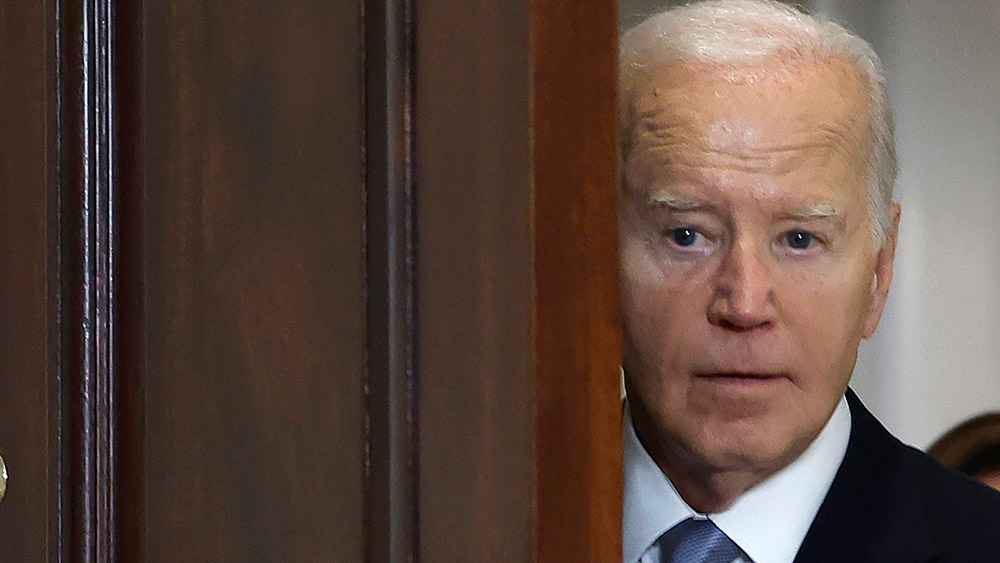$93M pandemic tax fraud scheme EXPOSED: Fraud, murder and the cost to taxpayers
07/03/2025 / By Willow Tohi

- Los Angeles-based tax fraud ring charged in $93M pandemic scheme after federal indictment reveals forged tax claims and murder plot.
- Scheme involved submitting falsified Coronavirus Response Credits forms under fake and real businesses ineligible for aid.
- Two defendants allegedly tried to kill co-conspirator to silence him before authorities’ crackdown, leading to his paralysis.
- U.S. Pandemic Response Accountability Committee reports $2.4B in suspected fraud, with billions likely unrecoverable.
- DOJ has secured over $500M in pandemic fraud settlements, but transparency advocates urge Congress to retain anti-fraud tools.
Federal authorities have unveiled the largest coronavirus-related tax fraud scheme to date, charging four Southern California residents with defrauding the U.S. Treasury of $93 million through forged claims under pandemic aid programs, and a murder plot to cover it. The June 11 federal indictment, unsealed by the FBI this month, details how Kristerpher Turner, Toriano Knox, Kenya Jones and Joyce Johnson led a conspiracy that spanned five years, targeting a federal pandemic relief program to pad their wallets. The scheme unfolded even as an informant nearly died: prosecutors say accused ringleader Turner was shot multiple times in 2023 in an attempt to silence his testimony—a crime that caused permanent paralysis. The case underscores systemic vulnerabilities in federal financial aid programs and the high stakes of recovering funds in crises.
The mechanics of the fraud: Bogus businesses and exploited workers
At the heart of the alleged scheme was the Families First Coronavirus Response Act (FFCRA), a 2020 law funding paid sick leave for businesses during pandemic lockdowns. The program permitted eligible employers to claim tax credits for wages paid to employees unable to work due to reasons like quarantine or childcare disruptions. But Turner and his associates allegedly turned this lifeline for struggling businesses into a money-grab.
Court documents show they filed fake tax forms under 148 companies—including non-existent “businesses” created with recruits’ stolen identities—and falsified payroll records to claim millions in undeserved tax credits. Jones, for instance, allegedly recruited family and friends, using their business registrations to file ineligible claims. Fraudulent participants deposited Internal Revenue Service (IRS) checks into bank accounts under the phony entities, while Turner skimmed 20-40% of proceeds as cut.
The four defendants capitalized on businesses’ desperation, according to court records. They targeted not only sham entities but also legitimate companies that met certain ineligibility criteria, leveraging access to their financial data to deepen the fraud. FBI agents estimate the total requested falsified refund amount exceeded $247 million — a figure more than double the disbursed $93 million — suggesting even employers unaware their data was exploited bore the system’s strain.
A twist of violence: Murder plot and paralysis
The conspiracy’s dark turn mirrors the high risks of corruption gone wrong. When the IRS began probing the scheme mid-2023, Knox and Jones allegedly organized a hit on Turner to keep him quiet. On Aug. 29, 2023, in broad daylight at a Gardena office complex, an enforcer shot Turner repeatedly with a .40-caliber pistol, according to the indictment.
Miraculously, Turner survived the attack but lost mobility, his wheelchair use now permanent. The violence, described as “uncommon in fraud cases” by federal prosecutors, reveals how financial crimes can escalate to collateral attacks on justice itself.
Pandemic fraud’s wider scourge: “Hundreds of billions lost forever”
This case is not an isolated incident. Earlier this year, another seven individuals were charged with $45 million in stolen pandemic tax credits, though they sought $600 million. These crimes mirror a flood of schemes that emerged as $4.2 trillion in federal relief was rushed into circulation between 2020 and 2024.
The Pandemic Response Accountability Committee (PRAC), a watchdog group set to sunset in September, reports over 1,100 post-pandemic fraud investigations, uncovering $2.4 billion in alleged fraud since October 2024. But its April 2025 report warns the “true scale” of losses is incalculable: some experts estimate $300 billion in pandemic relief may have been funneled through fraudulent claims, recouping only 15% of that.
PRAC Chair Michael Horowitz praised his team’s “$950 million in recoveries using advanced data tools,” but urged Congress to fund similar systems permanently. “Fraudsters will always exploit emergencies,” he said in a June 26 statement. “The price of complacency is more than money—it’s broken trust.”
Looking ahead: Lessons from disaster?
As serial fraudsters face trials—Knox and Jones potentially facing life terms—the case serves as a cautionary tale for future crises. The four accused spanned roles in “modern-day cons:” a scheming leader (Turner), recruiters preying on acquaintances (Jones) and enforcers resorting to murder (Knox). Their downfall came not from the IRS’s initial checks but social fractures within their own ranks.
For now, transparency advocates hope this case adds urgency to accountability demands. The DOJ has criminalized over 3,000 pandemic fraud defendants since 2020, and recovered $500 million in judgments. Yet without permanent oversight, the next crisis could repeat this cycle.
A chilling legacy of emergency aid abuses
The $93 million fraud’s combination of financial audacity and cold-blooded violence marks it as a tragic intersection of greed and governance failure. As the PRAC dismantles, its findings highlight enduring gaps: rapid federal spending, reliant on trust in businesses, risks becoming fertile soil for cons. The bill to cover this will fall on taxpayers, who now also face the shadow of violence guarding every shadowy corner of relief programs. When the next emergency arrives, will the lessons stick—or are we due for another reckoning?
Sources for this article include:
Submit a correction >>
Tagged Under:
accountability, big government, conspiracy, corruption, deception, DOJ, fraud, government debt, IRS, pandemic, tax fraud, violence
This article may contain statements that reflect the opinion of the author
RECENT NEWS & ARTICLES
COPYRIGHT © 2017 FAKED NEWS




















